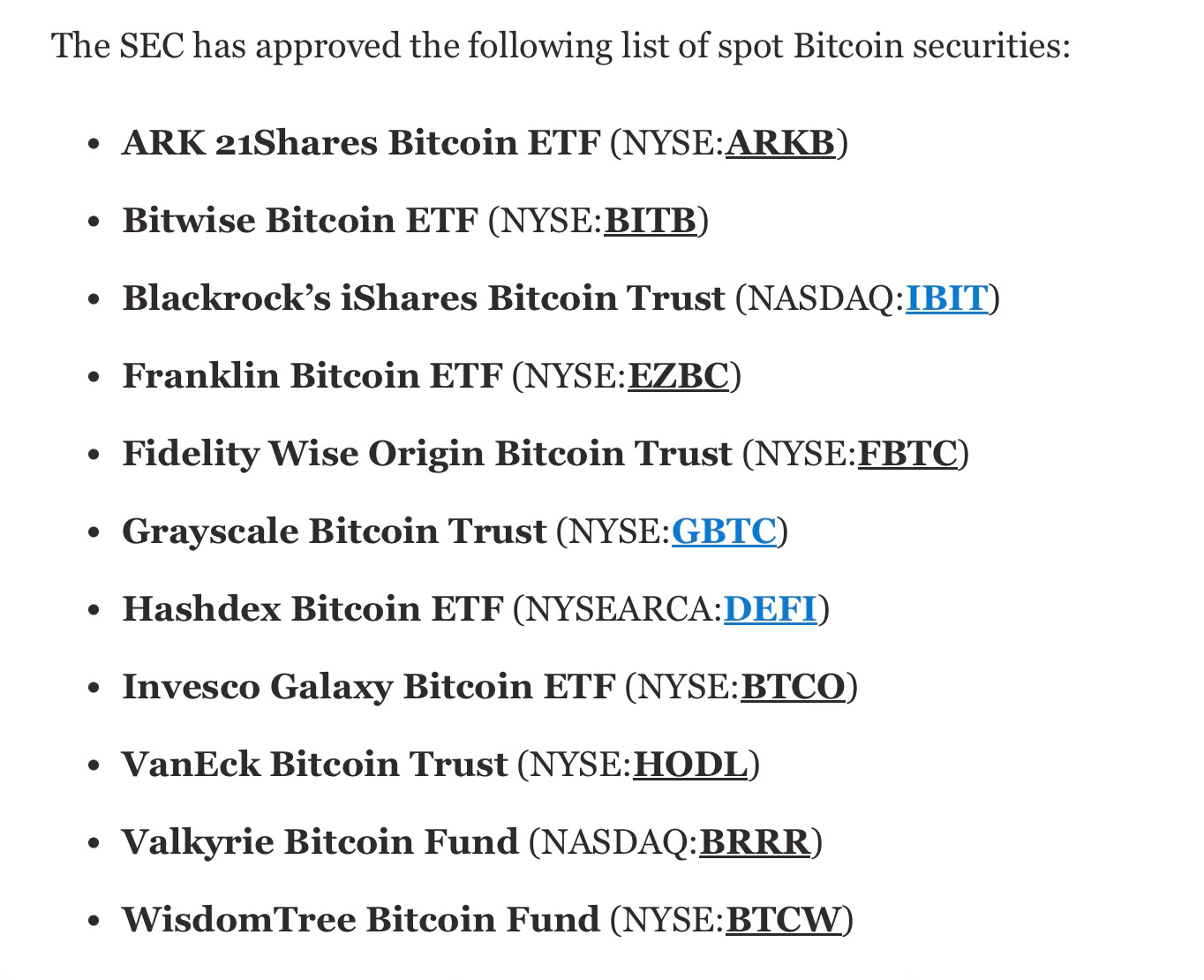How mergers and acquisitions affect stock prices: What you need to know
The result of an M&A on the value of your portfolio
Welcome to The Profit Zone, where 12,000+ millionaires, CEO’s and high-performing entrepreneurs read the #1 financial newsletter on Substack, providing you with weekly insights on the stock market and tips you can’t find anywhere else.
Happy Monday!
Let’s start the week off strong.
The agenda for today:
👉 The 3 major indexes are still on the rise
👉 SEC approved 11 Bitcoin ETFs
👉 The probability of rate cuts are rising
👉 How merger’s and acquisitions are affecting the value of your stocks
Tweet of the Week
Advertise with Us
Do you have a business that needs some more exposure?
Want to get more eyes on your products?
Advertise to 12,000+ investors with this newsletter who are hungry for financial content.
Or advertise on our Twitter and Instagram.
Click here to book with us.
Weekly Market Update 🗒️💡
Indexes
The 3 major indexes saw gains this past week with the Dow adding 0.34%, the S&P 500 rising by 1.84% and the Nasdaq leading the pack with a 3.09% gain on the week.
A solid earnings season is upon us
The economy remained healthy in the 4th quarter of 2023, says UBS.
Unemployment has remained low despite the labour market cooling and real wages are rising.
UBS expects a strong earning season to be coming our way, with companies beating expectations by ~3-5%.
Approved: Bitcoin ETFs
The Grayscale Bitcoin ETF GBTC 0.00%↑ captured the most retail investor dollars among all newly approved funds this past week, seeing an inflow of $28.4 million.
The approval marks a turning point in the crypto space, and helps expand access for individual and retail investors.
With the newly approved ETFs, investors can now own bitcoin in registered accounts, which is great for those who may want to gain some exposure to the crypto markets in their retirement accounts.
Are you buying Bitcoin ETFs?
Rate cuts?
Based on implied probabilities derived from interest rate futures trading as calculated on the CME FedWatch tool, the odds of a 0.25% point cut in the Fed’s rates rose to 70% on Thursday from 65% on Wednesday and about 62% a week ago.
The odds of a 0.50% point cut rose to almost 65% on Thursday, up from 53.4% on Wednesday and 48.9% a week ago.
Will we see rates start to fall in 2024?
It seems likely.
However with the labour market as strong as it is now, the Fed’s decision may be pushed back a bit.
Stayed tuned.
Mergers and Acquisitions: How Do They Impact Stock Prices?
Every single day, companies are constantly trying to acquire or merge with other companies to gain a competitive advantage.
Below is an image of the biggest mergers and acquisitions in history:
What is a Merger & Acquisition (M&A’s)
The term refers to the consolidation of companies through a financial transaction.
A company may purchase another company (acquisition) and establish itself as the new owner.
It may also decide to merge with another company of relatively the same size to form a new legal entity under one new corporate name.
In the realm of M&A’s, hostile takeover deals also exist, which occurs when a company does not wish to be purchased. These typically fall under the umbrella of an acquisition.
When it comes to Mergers, there are a few different types to highlight:
Horizontal merger: Two companies that share the same product lines and markets.
Vertical merger: A company that merges with a supplier or customer. Example: a car company merges with a tire supplier.
Congeneric mergers: A company that merges with another company that serves their customers in different ways. Example: a phone manufacturer and a telecommunications company.
Market-extension merger: A company that merges with another company that sells the same product but in separate markets.
Product-extension merger: A company that merges with another company selling different but also related products in the same market.
Conglomeration: A company that merges with another company that has no similarities.
Why do Mergers and Acquisitions Occur?
An M&A can take place for a variety of reasons. Here are the main ones:
Expansion of market share
Asset acquisition
Brand strengthening
Vertical integration
Access to new technology
Talent acquisition
Diversification
Access to licensing or distribution
Accelerated growth
Cost savings
What Happens to the Stock Price in A Merger or Acquisition?
In a perfect world, the target companies stock price can rise just based on pure rumours, if an acquisition is occurring.
This is because it shows investors that there is interest in the company and that another business sees its value.
On the flip side, the company that is doing the acquisition will normally pay a premium for the business to satisfy shareholders, usually from its cash reserves or in some instances from debt, so that companies stock price may fall as a result.
Another reason the company initiating the acquisition may see a fall in its share price is because of the opposing views of shareholders towards the acquisition.
Large shareholders may believe that the company is making the wrong decision to acquire another business, and may not think that it’s worth the price.
The reverse can also be true.
How Are Investors Compensated in a Merger?
There are 3 main ways an investor is compensated when a merger occurs:
Stock for Stock
Also known as an “all-stock deal”, in this situation, companies exchange stock for stock.
As an example, Company A acquires Company B and they agree on a ratio of 1:5, meaning for every 5 shares of Company B a shareholder owns, they will get 1 share of Company A when the deal goes through.
Cash-for-stock
As obvious by the name, acquiring Company A pays an agreed-upon price in cash for the stock of target Company B. In this scenario, shareholders will receive a specific amount of money for every share they own.
Cash-and-stock
A hybrid approach of the above that typically offers shareholders a choice of whether they want to get cash for their shares or an agreed-upon ratio of shares of the acquiring company.
Pros and Cons of Merger
Pros
The biggest advantage of mergers, for the acquiring company specifically, is that they allow the company to grow faster, enter new markets and regions, as well as acquire human resources they otherwise wouldn’t have had.
For the company getting acquired, shareholders can be offered big paydays depending on how the deal is structured. The may also have access to new resources, technology, and talent that they otherwise couldn’t get their hands on.
Cons
The biggest disadvantage of mergers is that they can easily fall apart and not make it to the finish line.
This can happen for a variety of reasons such as share price volatility, regulatory issues, or the CEO’s simply just changing their minds.
The problem becomes that the rumors build up hype in the markets around the merger and if they never materialize, the share price can plummet as a result.
It’s important to note that not all mergers are successful, and some can actually destroy more value than they create.
Investors in either company also need to be okay with volatility in the share price during talks of a merger.
If you have a low tolerance to risk, it may signal that it’s time to back out.
Final Notes…
In any case, it’s important to do your own research and due diligence to determine if a merger or acquisition will prove to be beneficial for your investment.
There have been tons of successful M&As that have created massive amounts of value and growth in both companies. However, there have also been many failed ones as well that have done more harm than good.
If you're lost on your financial journey, click here and get a copy of Financial Domination, my flagship course that will turn you from a beginner to a pro investor.
Fast Track to Financial Freedom
The truth about investing is that many fail miserably…
So many investors don’t get the pleasure of seeing what's in their wallets slowly rise as financial freedom grows closer.
Instead, their hope declines resulting in quitting on a journey that has made thousands of millionaires.
The main factor as to why they fail is because they have been misguided and misinformed, leading into a spiral of uncertainty and letting their emotional responses take over.
Thankfully, you’re in the right place to avoid exactly that.
Joining The Profit Zone is the first step in becoming the CFO of your money, enjoying life to the fullest and buying back your time along with 12,000+ other investors who are on the same journey towards financial freedom.
If you want to hit the ground running, consider upgrading to premium.
Premium subscribers get access to content free subscribers don’t get to see.
I can’t possibility give away all of my secrets ;)
Discover the secrets in a 14 day free trial.
See you in the next one!
Alex (The Dividend Dominator)
Founder and CEO of Dividend Domination Inc.
Follow me on Twitter, Instagram and LinkedIn
Some resources to help you make more money:
My Website - a one-stop shop for all things dividend investing.
Ca$hing in on Twitter - start building a following on Twitter and learn how to monetize it. Turn Twitter into your own personal cash-flowing asset that will pay you while you sleep.
My Full Stock Portfolio - get access to all of my positions and get updates every time I buy or sell.
Money Mastermind - the “Money Bible”. Myself and 29 other expert creators teamed up to create the most all-inclusive 280-page finance book on the market. Over 100 topics about money including real estate, crypto, budgeting, dividend stocks, online business, and more.
The Complete Investors Accelerator Pack - everything you need to build a dividend portfolio that grows on itself. Learn more about dividend investing, how to analyze dividend stocks, what to do with your dividends and how to build a stream of passive income through the stock market.
TweetHunter - let the software do the tweeting for you. The only scheduler you’ll ever need. This tool makes me money in my sleep. Give it a try for free.
Hipster Budget Guide - having trouble saving money? Learning how to budget is your solution. This book will show you ways to save money you never even thought of. Worth every penny.










